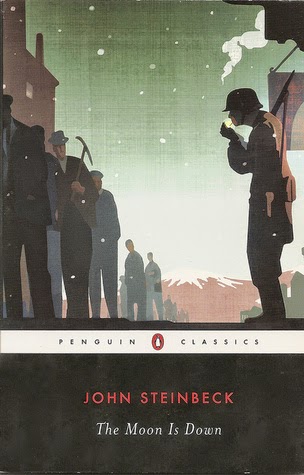So, I've made it through fifty chapters of Moby-Dick -- about 250 pages, which is about 40 percent. Though I'm behind the original reading schedule, I'm quite pleased about my progress. When I started this read-along, I was really apprehensive -- Moby-Dick is one of those books that are legendary, almost like War and Peace (which I have read) or Ulysses (which I haven't). It seems to be one of those books that either you read in school, and hated, or that you plan to read someday, but never get around to.
A quick summary of the novel so far: Ishmael, a rather mysterious narrator, travels to Nantucket to find a place on a whaling ship. There he meets Queequeg, and the two find jobs on the Pequod. After several days on board, they meet the notorious Captain Ahab, who is hell-bent on avenging the loss of his leg to the eponymous Moby-Dick, a legendary white sperm whale.
I like parts of it so far, but mostly, I was surprised by two different things. First, I was surprised at the close relationship between Ishmael and Queequeg -- on their first night together, they basically share the same bed and become very cosy. I'm not sure if this was common among sailors back in the 1850s, or I'm reading way too much into it.
Secondly, I was surprised by the novel's unusual structure. Like many novels of the era, it's broken up into lots of little short chapters -- some of them are less than a page long. But it's not a straight narrative like I'm used to. There are all kinds of random asides, like a short chapter about chowder (which I enjoyed) and a fairly long ramble about the color white (not as much).
I'm beginning to think this is a novel I would appreciate much more if I was reading this as part of a class -- I'm sure there are tons of allusions and Biblical references and metaphors that I'm just not getting. I tend not to read introductions and analyses of books until after I've finished them, because I hate spoilers (though I have a pretty good idea of how the book ends). I never took any American literature classes in college, and I read hardly any in high school -- I think I'm the only one I've ever met who didn't read Huckleberry Finn, Of Mice and Men, or The Great Gatsby while I was in school.
I can't say I love Moby-Dick so far, but I'm going to stick with it until the end. I've read quite a bit of the book online, but some in my print copy (pictured below), and, lately, some on audiobook, narrated by Frank Muller, which is just wonderful. My library owns two different versions on audio, and I've actually listened to both of them so far. I'm sorry to say that the other edition, narrated by Paul Boehmer, was so boring that I was sure I'd fall asleep while driving. Frank Muller is a much better narrator; in fact, I think I'd listen to pretty much anything he narrates.
Bloggers, have any of you read Moby-Dick? Did you love it or hate it? and which are the big fat books that you still want to read but never seem to get around to starting?













